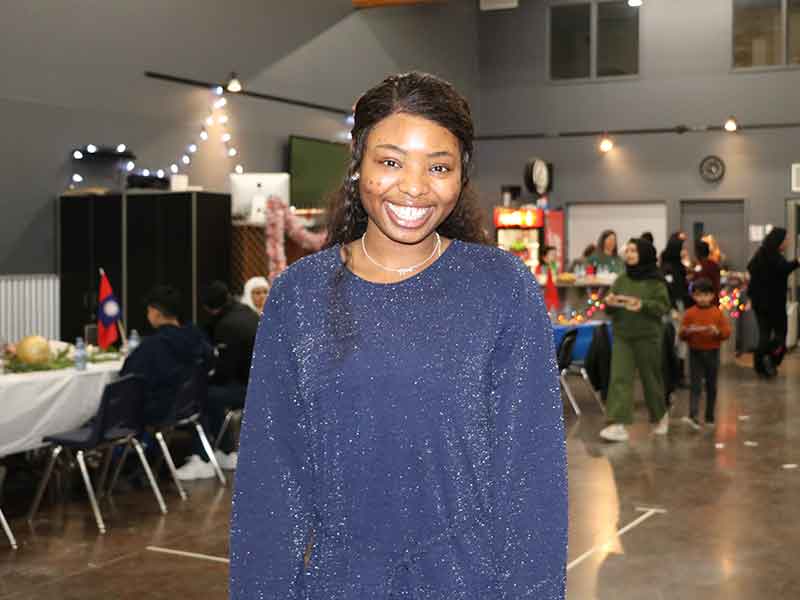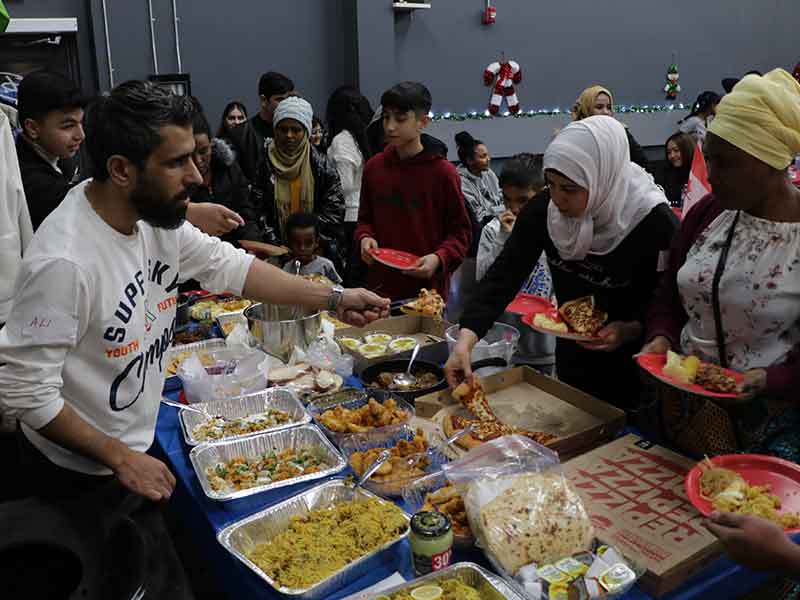“We are the lucky ones,” Blessing Yacibu shared as the Regional Connections Resettlement Assistance Program (RAP) held its first year-end celebration last month.
“Being a refugee is a great privilege. I am glad and blessed to be here,” Yacibu said as dozens of refugee families who have arrived in the Pembina Valley over the past two years gathered to celebrate their new lives at a party held in Winkler Dec. 19.
“I want to say thank you to everyone who has made it possible for me to have this beautiful life,” she continued. “I pray that all the refugees in all the countries would have the opportunity to be here in Canada, because there’s a better future here. And beautiful people.”
Yacibu was orphaned at the age of eight and left her native Nigeria for Morocco, looking for work.
Instead, she found herself the victim of human trafficking. The United Nations helped her escape and brought her to Canada at the end of 2022.
She knew very little about Canada and nothing at all about Winkler. But now it has become her home.
Without the Resettlement Assistance Program, through which the federal government provides financial assistance and other supports for refugees to establish themselves in their new home, Yacibu’s new life wouldn’t have been possible.
“Considering my situation, I could never afford to move to Canada on my own,” she said. “So it’s something I will all my life appreciate the government and the UN for bringing me here … now I am safe. My future is safe.”
Though RAP provides 12 months of government assistance, Yacibu found employment and became financial independent just two months after arriving in the Pembina Valley.
Photos by Ashleigh Viveiros/Voice
“A lot of people said, no, you don’t have to rush to work. I said no, I do. Because I know where I’m coming from. There is thousands of refugees out there. They are looking for opportunity, for a home. Begging on the streets, in the cold. There’s a lot of us waiting … so the money they are supposed to be paying me for the period of one year, I hope they can use to sponsor another orphan to come to Canada and experience the happiness, the joy that I’m having right now.”
Yacibu wants Canadians to know just how important programs like RAP are.
“If you are contributing to help refugees, it is not a waste,” she stressed. “It is changing people’s lives. It changed my life.”
She hopes she can return the favour, giving back to her adopted community and paying the kindness she has received forward.
“We’re not going to let Canada down,” she said.
Najibullah Abasi came to Winkler with his wife and five children just two months ago, fleeing the Taliban regime in Afghanistan.
“We came here to educate our children,” he said. “And for a safer future.”
It has been a challenging few months for the family, coping with the Manitoba cold and not having a vehicle to get around with, Abasis shared, but he is grateful for the support of Regional Connections and for the welcome his family has received from the community at large.
“We have friends who support us, neighbours who support and help us,” he said. “There is very good people here in Winkler. Everyone helps us.”
“I’m proud of these families”
It has been a busy couple of years for RAP in the Pembina Valley, said program coordinator Russelle Collantes.
“This program started last year, January 2022,” he said, explaining they initially received government funding for 50 refugees, but that agreement has since been expanded significantly.
“As of now, we do have 156 clients that we welcomed here in our region,” Collantes said, noting some refugees move on from the area after a time to be closer to family or to pursue work opportunities, but others have put down roots. “As of now, 23 families have decided to settle here in our area.”
They come here from all over the world, fleeing strife in their native lands and seeking a better future in Canada.
“Some of them are from Afghanistan, Syria, some of them are from places from Africa,” Collantes said. “It’s a mix of cultures.”
While the government provides these families with financial support, it falls on Regional Connections to help them settle into their new homes.
“Our responsibility is to make sure that these families could integrate in our area,” Collantes said, noting that there are many challenges for newcomers when it comes to securing affordable housing and getting around towns that don’t have public transportations systems. “But I’m proud of these families because even … with all those circumstances, they’re really willing to help themselves to be independent.”
The year-end gathering was meant to be a celebration of their resilience.
“It’s thanks giving,” Collantes said. “Thanks giving for our staff, the RAP workers.
“And also it’s just celebrating the families’ new beginnings here in our region … their new life here in Canada, the freedom that they’ll have, their better future, their family’s better future.”

